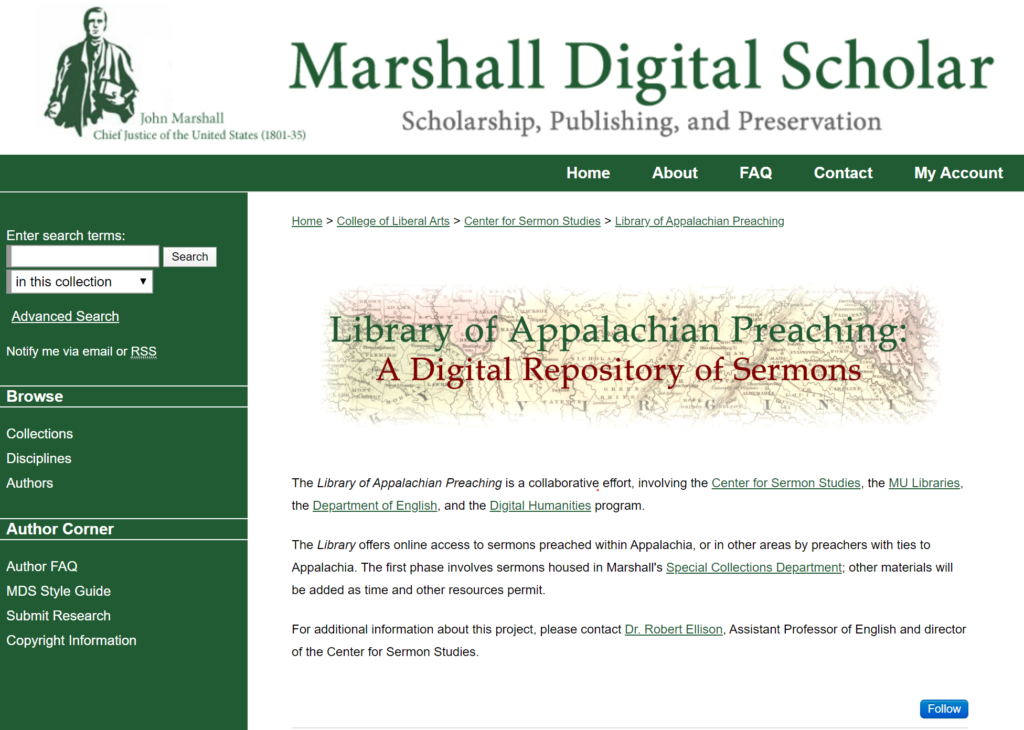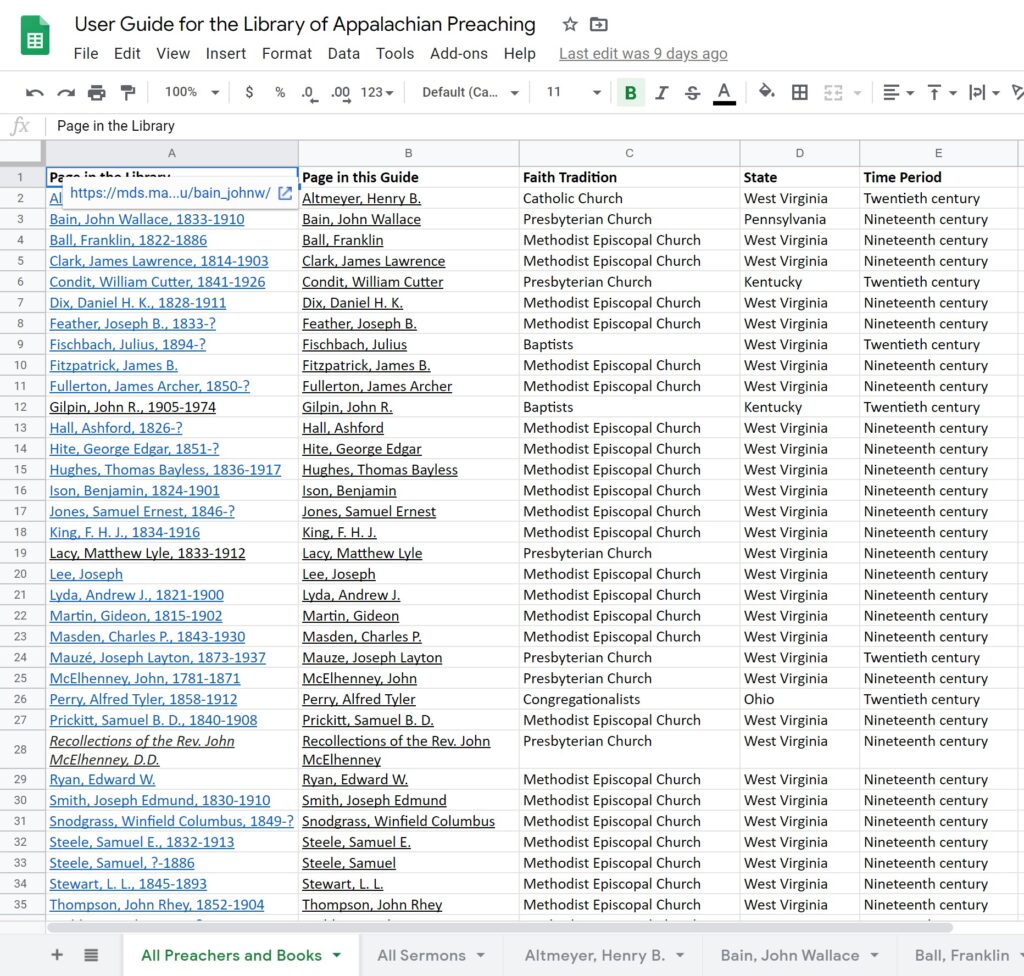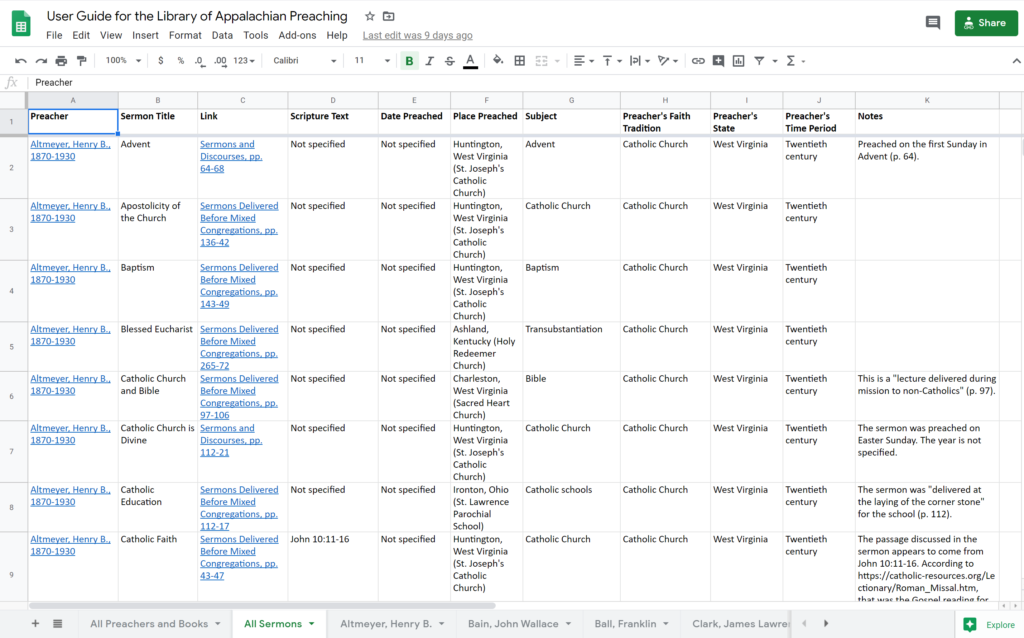This article appeared in the Volume 2, Issue 1 Spring/Summer 2020 issue of the Appalachian Curator. Click here to view a PDF of the full issue.
The Library of Appalachian Preaching: A Digital-Humanities Project at Marshall University
Robert H. Ellison and Larry Sheret
The Special Collections Department at Marshall University has a small but significant collection of sermons preached in Appalachia, or delivered elsewhere in the United States by preachers with ties to the Appalachian region. On the shelves are about 30 books published between 1865 and 1980. Some, like William Cutter Condit’s What Is My Life?, are pamphlets containing just one sermon. Others, like John R. Gilpin’s Sparks from a Busy Anvil, are books of several sermons by a single preacher; still others, such as The West Virginia Pulpit of the Methodist Episcopal Church, are books containing several sermons by many different preachers. Most are available elsewhere, in other libraries and/or online, but the Gilpin book and some others appear to be one of a kind.
Other one-of-a-kind items are stored in the archives. The Doris C. Miller Papers, for example, have baccalaureate sermons delivered in Huntington and Milton in 1957, and the Bokair Family Papers contain two sermons preached at Trinity Episcopal Church, Huntington in 1962. There are also two collections fully devoted to preachers. We have the manuscripts of two books of sermons by Julius Fischbach, a Huntington native, Marshall alumnus, and pastor of the First Baptist Church of Lansing, Michigan. The “crown jewel” of the sermon archives, however, is the M. Homer Cummings Papers, donated to the university by Cummings’ family in 2014. The collection is fitting for a minister who pastored Methodist churches in West Virginia for over fifty years: along with materials Cummings wrote—approximately 150 sermons, 100 newspaper columns, 40 poems, and 300 hymns—we have newspaper articles about him and his family, hymnals he compiled and published, and some 400 other hymnals from his library. Some of these materials have been processed, but much more remains to be done; a complete reorganization will take place in the spring of 2021, while Robert Ellison is on sabbatical.
These sermons are Phase One of the Library of Appalachian Preaching, a digital project curated by Robert Ellison, Assistant/Associate Professor of English, and Larry Sheret, Scholarly Communication & Open Education Resources Librarian. We are using Marshall Digital Scholar, our institutional repository, to make these materials to make these materials universally discoverable and accessible online (see Figure 1).

The first step, of course, is the sermons themselves. If something is already online, as is the case with several of the books, we will simply link out to it. If not, and it is in the public domain, we will create a high-quality, searchable PDF of our own. If it’s still under copyright, we will upload only a thumbnail image of the cover or title page. This will enable us to make the Library as complete as possible while maintaining compliance with copyright law.
But the sermon scans are only the first step. We are adding some features that we believe will help to make the Library as robust and user-friendly as possible. There will be a brief biography of each preacher, with links to additional information; the sketch for the first preacher in the Library reads as follows:
[Henry] Altmeyer was born in Wheeling, West Virginia; was ordained to the priesthood in 1897; and was the pastor of St. Joseph Catholic Church in Huntington, West Virginia, from 1899 to 1930. For additional information, see a history of St. Joseph Parish and a biographical sketch drawn from Cabell County Annals and Families (Richmond: Garrett & Massie, 1935).
We are also building a User Guide, a Google sheet which users can search, sort, and download (See Figure 2). There is a master list of names, listing the preachers’ faith traditions, the Appalachian states with which they are most closely associated, and the centuries in which they worked. The official Library of Congress Authorities are used throughout the Guide.

There is also a Guide to each preacher’s sermons, with the sermon title, scripture text, the date and place preached (if known), the subject of the sermon, and a link to the digitized text. Finally, these individual guides are combined into a single master list, so the entire Library can be searched at once (see Figure 3).

A more extensive discussion of the Library is available at https://mds.marshall.edu/digital_humantities/2020/accepted_proposals/2/. Once Phase One is complete, the Library will expand to include Appalachian sermons in other libraries, the Internet Archive and other online sources, church records and private collections, and so on. Readers who are aware of materials that could be added to the project are invited to contact the authors at ellisonr@marshall.edu or sheret@marshall.edu.
One Comment
Sharon Conner
Was anything new discovered about Francis Asbury’s sermons given with Vater Shuk (Jacob Shook, Clyde, Haywood County, NC) and with Daniel Killian, Asheville, NC. Asbury overnighted with both of these men when he traveled in the WNC area? Just wonderin’. . . . thanks!